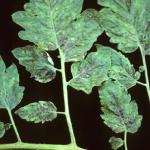Solanaceous, Tomato Spotted Wilt Virus
TSWV (Tomato Spotted Wilt Virus) is a member of the Tospoviruses which include INSV (Impatiens Necrotic Spot Virus). Tospoviruses, especially INSV, are most important in the greenhouse industry. These viruses are vectored exclusively by eight species of thrips; Western flower thrips (Frankliniella occidentalis) and tobacco thrips (F. fusca) are the most important vectors. TSWV has an extremely wide host range and can infect over 1000 species of cultivated and weedy plants. The broad host range and difficulty in controlling thrips makes this disease difficult to control.
Identification:
TSWV causes black, small, irregularly shaped lesions on tomato foliage. Stems and shoots may exhibit black streaks. Severely affected plants may wilt and become stunted. Fruit develops chlorotic rings, patches, or lesions.
Life Cycle:
Numerous landscape plants, greenhouse ornamentals, and weeds may be reservoirs of the virus. Thrips transfer the virus in a persistent manner. The virus is not seed-borne.
Cultural Controls & Prevention:
There is no cure or chemical treatment for plant viruses.
- Discard affected plants
- Eradicate weeds that may be hosts
- Control thrips populations.
- Inspect plant material at arrival or quarantine new shipments.
- Do not grow vegetable transplants and ornamental bedding plants in the same greenhouse.
Chemical Controls & Pesticides:
For Current information on disease recommendations ins specific crops including information on chemical control & pesticide management, please visit the New England Vegetable Management Guide website.
Crops that are affected by this disease:
The Center for Agriculture, Food and the Environment and UMass Extension are equal opportunity providers and employers, United States Department of Agriculture cooperating. Contact your local Extension office for information on disability accommodations. Contact the State Center Director’s Office if you have concerns related to discrimination, 413-545-4800 or see ag.umass.edu/civil-rights-information.
